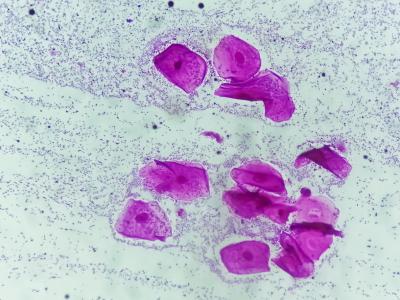Study finds no decrease in flu hospitalization in vaccinees
The influenza vaccine did not reduce the risk of hospitalization for flu after vaccine failure, according to an analysis of 8 years of data published yesterday in Vaccine.
Over eight flu seasons starting in 2004, scientists from the Marshfield Clinic Research Foundation in Marshfield, Wis., enrolled all adults who presented with an acute respiratory infection. They recorded hospital admissions within 14 days after illness onset for all those with lab-confirmed influenza.
Of 4,996 enrolled patients, 1,393 (28%) had lab-confirmed flu. Of 1,020 patients with influenza A, 62 (6%) were hospitalized, as were 17 (5%) of 369 influenza B patients.
The investigators found that patients who had received the trivalent flu vaccine had no significant reduction in risk of hospitalization for any type of influenza or for the influenza A or B subgroups. Adjusted odds ratios were 1.08 for any influenza, 1.35 for influenza A, and 0.67 for influenza B.
The authors conclude, "These findings do not support the hypothesis that vaccination mitigates influenza illness severity."
Nov 26 Vaccine abstract
US tularemia case count holding steady
The United States had 1,208 reported cases of tularemia in the first decade of the 21st century, nearly the same as in the preceding decade, but their geographic distribution shifted slightly, according to the Centers for Disease Control and Prevention (CDC).
Tularemia is caused by the bacterium Francisella tularensis and is spread by insect bites, contact with contaminated animals such as rabbits, contaminated aerosols, and contaminated food or water. It is classified as a Tier 1 select agent because of its bioterrorism potential.
The 1,208 cases reported from 2001 through 2010 compare with 1,216 cases reported from 1991 through 2000, the CDC reported in Morbidity and Mortality Weekly Report (MMWR). The median number of cases per year was 126.5, and 64% of cases were confirmed, with the rest listed as probable.
The average annual incidence of cases was 0.041 per 100,000 people. Patients had a median age of 39, and 68% of them were male. By subgroup, annual incidence was highest among children ages 5 to 9 (0.071) and men ages 65 to 69 (0.11).
Forty-seven states reported cases, but 59% of cases were concentrated in six states: Missouri (19%), Arkansas (13%), Oklahoma (9%), Massachusetts (7%), South Dakota (5%), and Kansas (5%). The hardest-hit county was Dukes County, Massachusetts, with 67 cases.
The CDC says cases were slightly less concentrated in the central states than they were in the 1990s, and the proportion of cases in the Northeast and West Coast (California and Washington) increased.
Nov 28 MMWR article
Lawmakers want FDA to rewrite two proposed FSMA rules
Numerous members of Congress have joined those calling on the Food and Drug Administration (FDA) to take another swing at the produce and preventive-controls rules it has proposed under the Food Safety Modernization Act (FSMA), according to a Food Safety News (FSN) story today.
A Nov 22 bipartisan letter signed by about 75 members of the House and Senate calls on the FDA to redraft the rules and take a second round of public comments before making them official, the story said. The lawmakers argue that moving ahead with the rules as written would be "severely detrimental" to American agriculture.
In another Nov 22 letter, 23 members of the House Organic Caucus have called for changes in the proposed rules, according to the story. The letter voices concerns that organic produce growers have about proposed regulations for handling manure and compost. The lawmakers want the regulations aligned with those of the National Organic Program.
In addition, a Nov 13 letter from Sens. Jon Tester, D-Mont., and Kay Hagan, D-N.C., expresses similar concerns raised by those operating small farms and facilities "with short supply chains," FSN reported.
The letters are among about 20,000 written comments the FDA has received on the proposed rules, the story said. It notes that a campaign to persuade the FDA to rewrite the rules was launched in September by the National Association of State Departments of Agriculture and was embraced by the United Fresh Produce Association, along with small and organic producers.
Nov 27 FSN report
Related Oct 3 CIDRAP News item
Measles, polio vaccination begins in Philippines
The Philippines government, the World Health Organization (WHO), the United Nations Children's Fund (UNICEF), and other agencies began a campaign yesterday to vaccinate children against measles and polio in Tacloban, the city hit hardest by Typhoon Haiyan, the WHO said yesterday.
The immunizations signal the first phase of the large-scale campaign. This phase is targeting more than 30,000 children in Tacloban in evacuation centers and in communities, using mobile health teams, the WHO said in a statement. The children also received vitamin A supplements.
"It is virtually unprecedented that within two-and-a-half weeks of a disaster of this scale, with this level of devastation and these logistical challenges, that a mass vaccination campaign is already rolling out," said Dr. Julie Hall, WHO representative in the Philippines.
At the request of the Philippines government, UNICEF bought more than $2 million worth of vaccines to replenish in-country stocks that are being used for the campaign, the WHO said.
Nov 26 WHO statement













